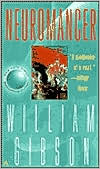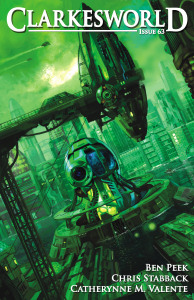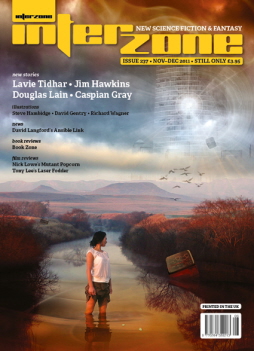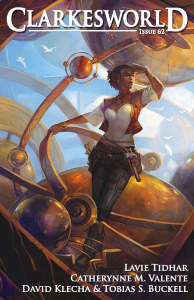 Back in 1977, science-fiction writer Isaac Asimov wrote a piece for Advertising Age predicting, among other things, that consumers would opt to receive ads personalized to their interests as well as the role of “persuasion techniques developed by advertology (sic)” to promote social change. While Asimov got the general idea right, he was wrong on the delivery channel for target marketing (he thought it would be television, having no notion of the Internet) and the evolution of political advertising (he thought it would be for the purpose of “battling ignorance and folly” as opposed to most political messages today that’d rather promote ignorance and folly).
Back in 1977, science-fiction writer Isaac Asimov wrote a piece for Advertising Age predicting, among other things, that consumers would opt to receive ads personalized to their interests as well as the role of “persuasion techniques developed by advertology (sic)” to promote social change. While Asimov got the general idea right, he was wrong on the delivery channel for target marketing (he thought it would be television, having no notion of the Internet) and the evolution of political advertising (he thought it would be for the purpose of “battling ignorance and folly” as opposed to most political messages today that’d rather promote ignorance and folly).
Asimov was from a generation of SF writers who saw their avocation in part as to predict the future as a positive, better place to live. In the same article, Asimov conjectured that by 2000, “Energy will once more be relatively plentiful, and it will be used more wisely, we hope, by a world that has been taught by the events of these recent decades to cooperate for survival.” Good luck with that.
I was thinking about this after reading “Novelists Predict Future With Eerie Accuracy” by John Scwartz in The New York Times Sunday Review. He notes the range of predictions that have come to pass, ranging from Jules Verne staging moon launches from Florida to Arthur C. Clarke’s anticipation of satellite communications to Internet virtual realities envisioned by William Gibson and Bruce Sterling, two of the founding fathers of the cyberpunk movement in the 1980s. But he fails to distinguish between those like Asimov who hoped they were right in promoting a future enhanced by technological development and those whose extrapolations of global corporate and media trends led to more decidedly dystopic premonitions.
 Alas, it seems as if the optimists who envisioned the twenty-first century as some sort of glittering technological utopia might have gotten some of the details right, but the award for getting right the overall picture of media and marketing malevolence goes to the more pessimistic cyberpunks. As the opening line of the archetypical cyberpunk novel — Gibson’s Neuromancer — describes it:
Alas, it seems as if the optimists who envisioned the twenty-first century as some sort of glittering technological utopia might have gotten some of the details right, but the award for getting right the overall picture of media and marketing malevolence goes to the more pessimistic cyberpunks. As the opening line of the archetypical cyberpunk novel — Gibson’s Neuromancer — describes it:
The sky above the port was the color of television, tuned to a dead channel.
Gibson delineates a world in which industry, technology, and mass media dominate human existence, but not in good ways that Asimov thought it might turn out. Certainly not one in which we’ve all decided to cooperate for our mutual survival.
 The December issue of Clarkesworld is currently online. Featured fiction: “Sirius” by Ben Peek, “In Which Faster-Than-Light Travel Solves All Our Problems” by Chris Stabback and the conclusion of Catherynne M. Valente’s “Silently and Very Fast.” Non fiction by Brenta Blevins, Jeremy L.C. Jones and Neil Clarke. The cover art is by Folko Stresse.
The December issue of Clarkesworld is currently online. Featured fiction: “Sirius” by Ben Peek, “In Which Faster-Than-Light Travel Solves All Our Problems” by Chris Stabback and the conclusion of Catherynne M. Valente’s “Silently and Very Fast.” Non fiction by Brenta Blevins, Jeremy L.C. Jones and Neil Clarke. The cover art is by Folko Stresse.
 The November
The November 
 The November issue of Clarkesworld is currently
The November issue of Clarkesworld is currently  The latest Apex Magazine is now
The latest Apex Magazine is now 
 Well, just as everyone is remarking on how the new conversant iPhone is making science fiction true to life, one pretty big part of the science fiction imagination remains just that; while the 21st century has not only arrived, we’re a decade into it, but we won’t be taking any sight seeing trips to Mars in the near future. Even a suborbital cruise will have to wait until 2013. The overly ambitiously and to-date technically impossibly named
Well, just as everyone is remarking on how the new conversant iPhone is making science fiction true to life, one pretty big part of the science fiction imagination remains just that; while the 21st century has not only arrived, we’re a decade into it, but we won’t be taking any sight seeing trips to Mars in the near future. Even a suborbital cruise will have to wait until 2013. The overly ambitiously and to-date technically impossibly named  Back in 1977, science-fiction writer
Back in 1977, science-fiction writer  Alas, it seems as if the optimists who envisioned the twenty-first century as some sort of glittering technological utopia might have gotten some of the details right, but the award for getting right the overall picture of media and marketing malevolence goes to the more pessimistic cyberpunks. As the opening line of the archetypical cyberpunk novel — Gibson’s Neuromancer — describes it:
Alas, it seems as if the optimists who envisioned the twenty-first century as some sort of glittering technological utopia might have gotten some of the details right, but the award for getting right the overall picture of media and marketing malevolence goes to the more pessimistic cyberpunks. As the opening line of the archetypical cyberpunk novel — Gibson’s Neuromancer — describes it:
 As usual, I’m behind the curve. I was delighted when I first heard that Ann VanderMeer was taking over Weird Tales but never got around to reading an issue under her direction because, well, I just never got around to it. Alas, now she’s been relegated to the slush pile as a new owner wants to return the magazine back to its pulp Lovecraftan roots (although, the
As usual, I’m behind the curve. I was delighted when I first heard that Ann VanderMeer was taking over Weird Tales but never got around to reading an issue under her direction because, well, I just never got around to it. Alas, now she’s been relegated to the slush pile as a new owner wants to return the magazine back to its pulp Lovecraftan roots (although, the